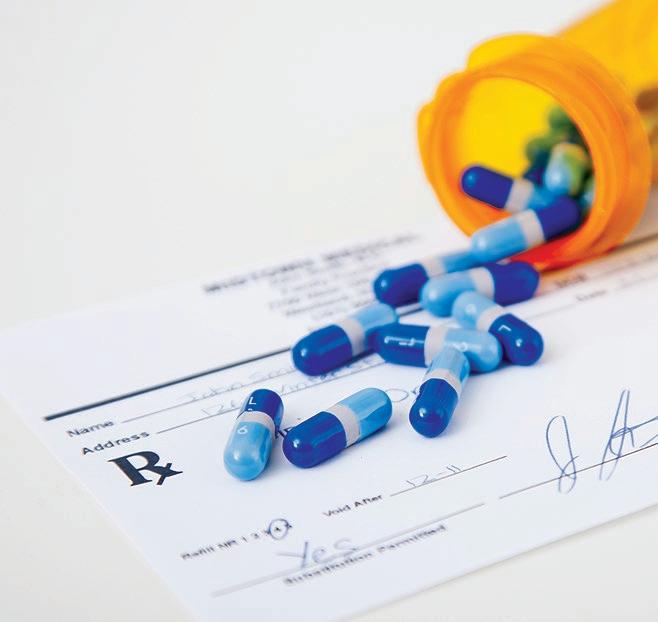
4 minute read
HEALTHY BODY
WEIGHT GAIN THAT'S NOT FAT'S FAULT
By Dr. Kristie
Advertisement
You look at the scale and see you're up three pounds and immediately go into panic mode. You've been eating right and staying physically active. Why is the scale inching higher? Before getting flustered, realize that weight fluctuates on a daily basis. It can go up or down by up to 5 pounds and those weight changes don't necessarily mean you've gained body fat. Let's look at some common reasons you may be up a few pounds that have nothing to do with acquiring body fat. You Ate Too Much Salt
Did you eat a restaurant meal the day before? Restaurant fare is notoriously high in sodium and the same is true of ultra-processed packaged foods. After eating a meal that contains too much sodium, your body retains enough fluid to boost your body weight by a few pounds and it can take several days for the excess water to subside.
What's the solution? Drink more water and reduce your sodium intake. Drinking more water may seem counterintuitive, but consuming water helps your body flush out excess sodium. As that happens, your weight will drop. Keep tabs on how much sodium you're consuming by limiting restaurant meals and reading the label of processed foods to see how much sodium they contain. Even better, stick to whole, unprocessed foods that are naturally low in sodium.
You Ate Too Much the Day Before
If you wake up in the morning and are up a few pounds, question what you ate the day before. Consuming a heavy meal, like a holiday dinner, can increase your body weight by 2 to 5 pounds. Part of the increase in weight comes from the weight of what you ate, but it's also water retention, due to sodium, and the impact of consuming too many carbohydrates. Your muscles and liver store carbohydrates as glycogen. Each gram of glycogen your body stores in your liver or muscles is attached to 3 or 4 grams of water. That's why your bodyweight rises when you fill up your glycogen stores after a high-carbohydrate meal. It may take a few days to return to your normal body weight after a trip to a buffet or a large holiday meal.
It's Your Hormones
If you're still having periods, you may have noticed you gain weight at certain times during your cycle. Also, taking supplemental hormones, such as hormone replacement therapy or birth control pills, can sometimes cause weight gain. Most of this weight gain is due to fluid retention rather than a rise in body fat. If you're not taking hormones, you will likely lose the extra weight as you progress through your cycle.
When the number rises on the scale, it doesn't always mean you've gained body fat. Be prepared for daily weight fluctuations of up to 5 pounds from day to day and know that they're normal. Don't become too obsessed with the bathroom scale. Focus on being your healthiest instead!

Stress can also cause weight gain due to water retention by increasing the stress hormone cortisol. You might notice water weight gain and, if it's sustained, fat gains around the waist and tummy. Stress reduction is the best remedy for this type of weight gain.
You Started a New Medication
A long list of medications can cause weight gain. Some of this weight increase is due to fluid retention, while other medications cause an increase in appetite or slow your resting metabolic rate, leading to a rise in body fat over time. Some medications that cause weight gain include anti-depressants, antihistamines, antipsychotic medications, corticosteroids and medications used to treat seizures. This isn't an exhaustive list, so always ask your physician if a new medication they prescribe causes weight gain.
If your weight suddenly increases, check your medications. A number of medications can cause temporary weight gain including non-steroidal anti-inflammatory medications (usually due to water retention), antihistamines, prednisone, anti-depressants and other medications used to treat mood disorders, to name a few. Your weight should return to normal once you stop the medication, so you won't be surprised with the number the scale spits back at you.
You're Constipated
If you're constipated, the unpassed food will add to your body weight. If you've ever weighed yourself before and after a bowel movement, you may have noticed that your weight drops by a few pounds. If constipation is a problem, add more fiber to your diet, drink more water and increase your activity to keep things moving. Most people don't consume enough fiber to maintain regular bowel movements.
Medical Park Pharmacy
New 2021


Kevin Regier, R.Ph. 620-792-1221
• Free In-town Delivery • Friendly, Quality Service • Patient Profile Card and Tax Records Upon Request




